Omid Scobie Knows How Prince Harry and Meghan Markle Feel
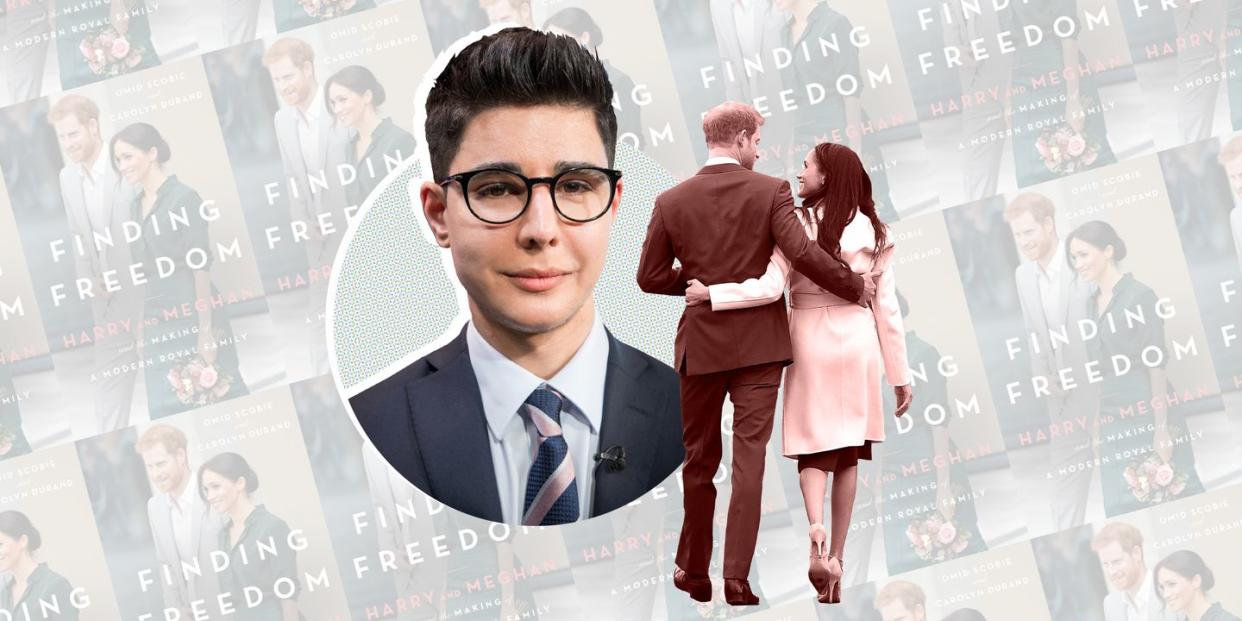
If you were to form your opinion of journalist Omid Scobie from what’s been written in the British tabloids and social media, you might think he was an arm of the Duke and Duchess of Sussex’s publicity machine. He’s been painted as a social climber, a royal sycophant, and worse.
“Mouthpiece, cheerleader, unofficial spokesperson, not a journalist, I’ve heard them all,” Scobie says as we speak on Zoom this week. He smiles and rolls his eyes as he lists off the accusations. “I think the problem is I’m on a side of history that many others don’t want to be a part of, and it’s rubbed people the wrong way, much as the Sussexes have.”
It’s the eve of the launch of Finding Freedom, the royal biography of Prince Harry and Meghan Markle that the 39-year-old Scobie co-wrote with veteran royal journalist Carolyn Durand. He’s jumping from video call to broadcast with a lighting setup in the corner of a chic, modern London apartment. He’s remarkably calm, but I sense a restrained excitement about his first book. He’s eager to hear what people think of it, and he’s looking forward to reading the reviews. As for the comments, his time on the royals beat has taught him not to take them to heart.
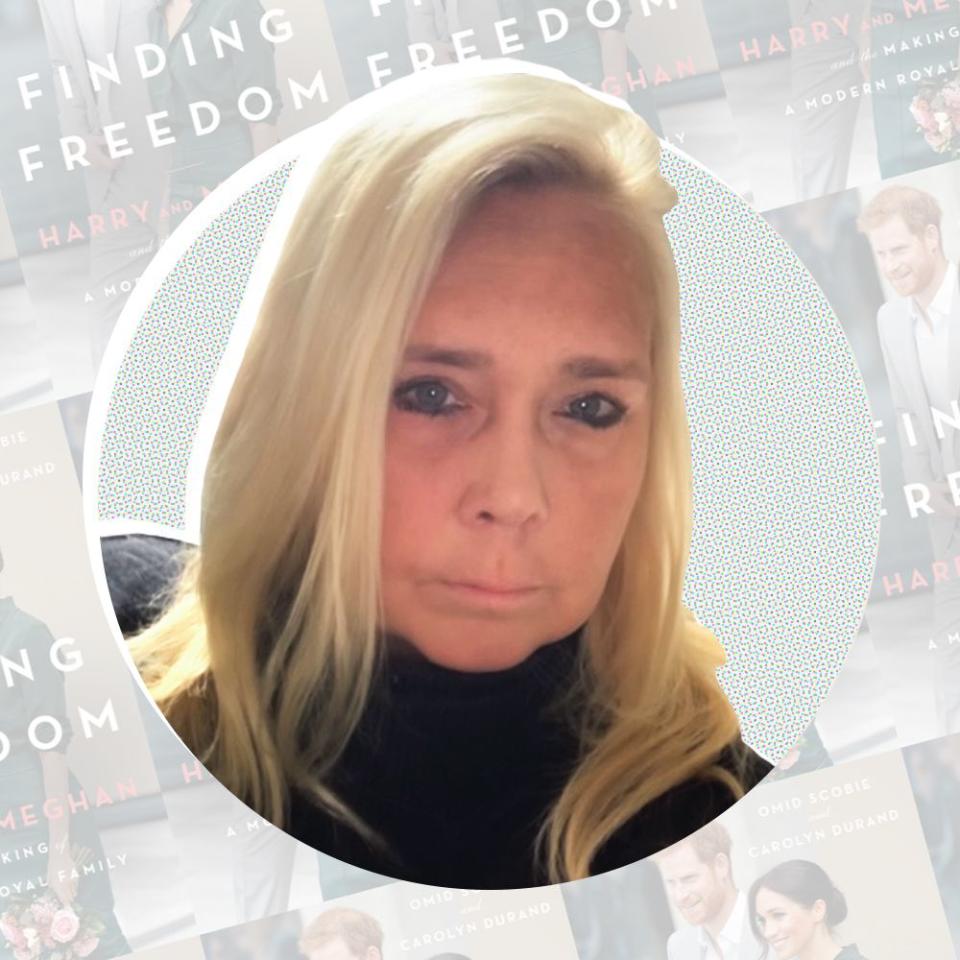
The storm of fame and scrutiny that has swirled around Markle, a biracial American former actress, is unmatched. An estimated 29.2 million Americans watched her marry Prince Harry, and tens of millions more read about every detail of the wedding online. But what started as a very modern fairy tale took a dark turn, and the media coverage of the newly minted Duchess of Sussex was marked by the othering of Markle, with undertones that were unmistakably racist and sexist. Her enjoyment of avocados was tied to human rights abuses. During her pregnancy, if she touched her growing bump at an event, she was desperate for attention. Her trip to New York for a baby shower was painted as a gross excess.
Over the last two years, the Sussexes have fought back against coverage they believe to be unfair or even illegal, issuing statements and filing lawsuits. At the same time, those closest to the couple have quietly confided in Scobie and Durand.
“I think this book wouldn’t have happened had many of [our sources] not felt frustrated by the coverage they saw of their friends in sections of the tabloids here. I think there were many people that felt what we were seeing about the couple was far away from who they were, so to have a place where they could actually share another side of the story was very important to them,” Scobie says. “Had things been very different with the press over here, we probably wouldn’t have been able to put this book together.”
The book, drawn from interviews with more than 100 sources, some named and many anonymous, is the culmination of a whirlwind three years on the Sussex beat. Scobie has followed the couple from the very beginning, giving readers rare peeks behind the curtain, breaking news on Twitter, his podcast The HeirPod, TV, and for the American edition of Harper’s Bazaar. Five years ago, royal watchers had never heard of him; now he’s being compared to Andrew Morton, Princess Diana’s trusted biographer.
But this was never the plan.
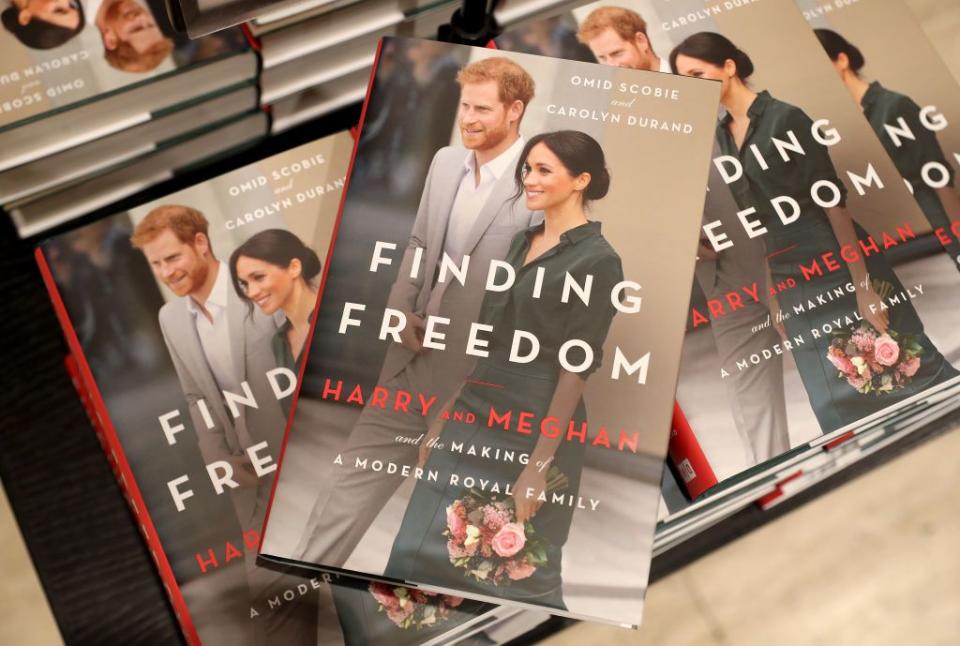
Scobie, who grew up in Oxford, England, had dreamed of being a journalist since he was four years old; he would crawl into empty cardboard boxes to pretend to be a TV news presenter. When his father, who worked in telecommunications, would travel to the United States, he’d bring his son back American magazines like Rolling Stone and Us Weekly (then called Us), which sparked an interest in entertainment reporting and magazine journalism.
But by the time he went to school, Scobie had decided he wanted to be a video game correspondent, and he wrote guides for game publishers when he was studying journalism at University of Arts London. He soon realized the pay wasn’t what he’d need to live in London, so he switched to entertainment journalism, getting a job at British celebrity magazine. He stayed for less than a year.
“A boss had used very terrible language about me several times, and when I presented that to the publisher it was basically taken as me trying to cause trouble and having a chip on my shoulder or playing a race card,” says Scobie, who is British and Persian.
(He writes in Finding Freedom about experiencing microaggressions later in his career, as well, such as when a senior palace aide told him, “I never expected you to speak the way you do.”)
After leaving the publication, Scobie took a position at Us Weekly as European bureau chief. He was there for more than a decade, during which he helped grow the team to more than 40 correspondents across Europe, Asia, and Africa. He estimates that about 30 percent of the job was reporting on royals. Though he hadn’t paid much attention to the British royal family before, he grew to like that part of the job due to the access he was able to get as a correspondent: invites to small events with the royals and just a handful of other reporters, plus private briefings and social gatherings with the royal family. At the time, readers were mostly interested in the Duke and Duchess of Cambridge and their young family, so that’s where Scobie focused his coverage.
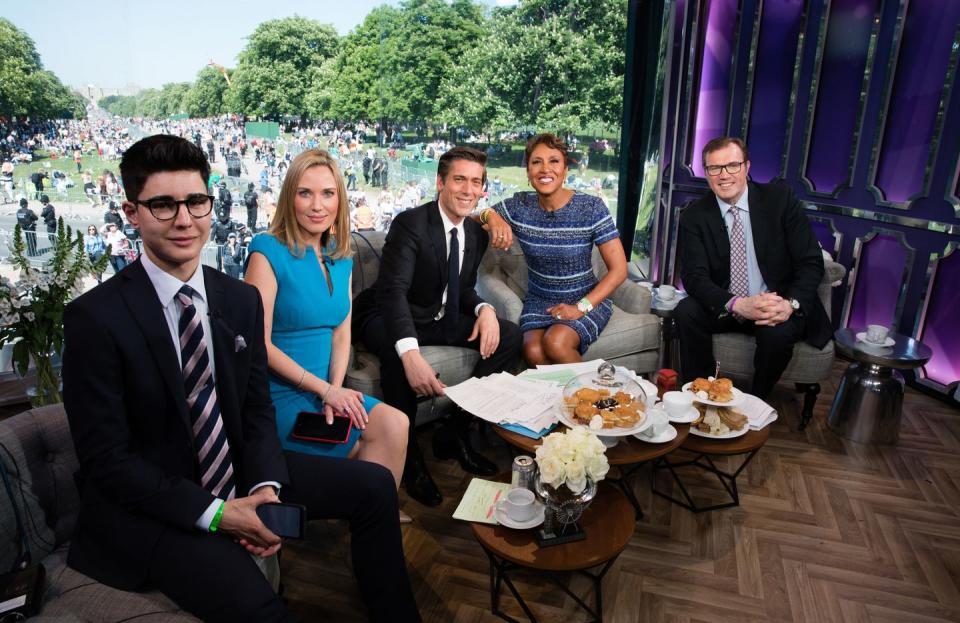
Everything changed when Prince Harry began dating a star of the TV series Suits.
“When the Sunday Express first editions had dropped [breaking the news of the relationship], a friend of mine texted me the front cover. I was like, ‘Christ. Potentially huge,’” he says. “I know a lot of people didn’t believe it at first, but it just… I don't know. I don’t know why, my sixth sense was like, ‘This is legit.’ It turns out I had a source in Toronto who literally that evening was like, ‘Yeah, it’s true and they’re actually in Toronto at the moment.’ Really, ever since that call I have never stopped covering their story.”
Scobie quickly built a deep bench of sources close to the couple, making them his primary beat, and he joined a small group of journalists who report exclusively on the royal family but are not a part of the traditional British media system.
The morning of the royal wedding, which he covered for Good Morning America, the broadcast team began scouring for clues of who could have designed the bride’s gown. Before Markle stepped out of the vintage Rolls Royce, Scobie passed a piece of paper to the morning show’s executive broadcast producer, Simone Swink. It read: Clare Waight Keller.
“She was on almost no one’s list at that moment,” Swink says. “And he was right. That’s the kind of sourcing and reporting he has—excellent.
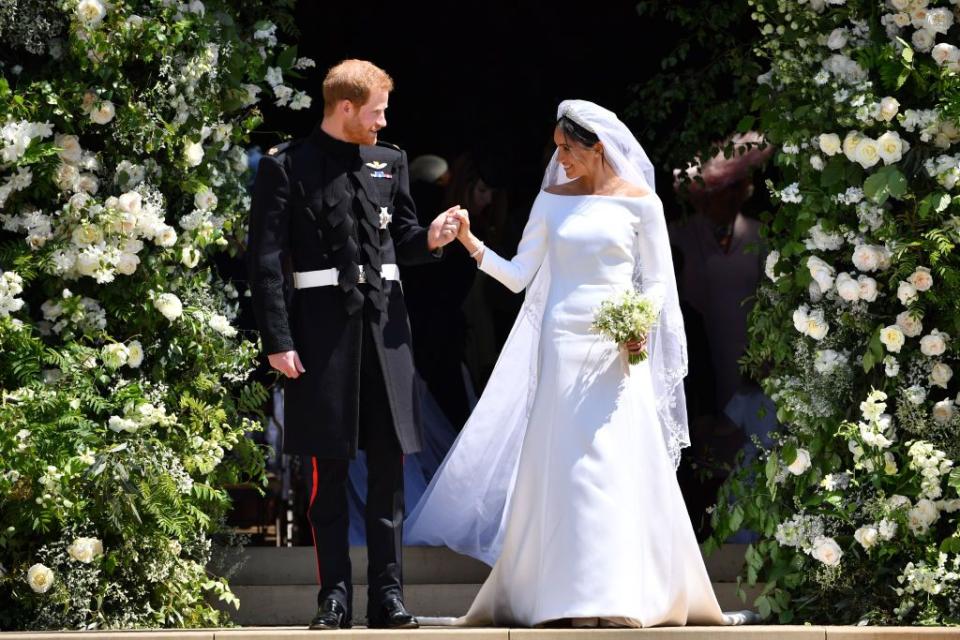
When Us Weekly was sold to a new publisher later that year, Scobie left the publication, but not the royal beat. In 2018 he started as an ABC contributor, where he’d previously appeared on air. He also picked up a position as royal editor-at-large at American fashion magazine Harper’s Bazaar (owned by Hearst, the same parent company as Town & Country). The same year he started a podcast called “On Heir” with Mail on Sunday royal editor Emily Andrews, which lasted for a little more than a year. In October 2019 he launched “The HeirPod,” a similar royals podcast with ABC Audio. The first episode was a deep dive into Meghan and Harry’s tour of several nations in Africa, their first tour as a family after the birth of their son.
It was Durand, a longtime Good Morning America producer and now contributor to Elle magazine (another Hearst publication), who came to Scobie about two months before the royal wedding with the idea of writing a book. Durand has good sources at Buckingham Palace and among the senior royals, while Scobie knows those around the Sussexes; their expertises were uniquely complementary.
The book they proposed was supposed to come out after Archie’s birth in May 2019. But as they began to wrap up their reporting, their sources started relaying trouble behind the scenes and murmurings that the Sussexes were unhappy with their current role in the royal family. This was, suddenly, a very different book.
“Around Archie’s birth…we realized that there was a bigger story happening here. That this was a couple who were incredibly frustrated with some of the situations with their roles and their place within the institution of the monarchy, and not being heard when it came to lots of different things,” Scobie says.
They got started on a whole new round of reporting that would push the book back a year, and would explain what, exactly, went wrong.
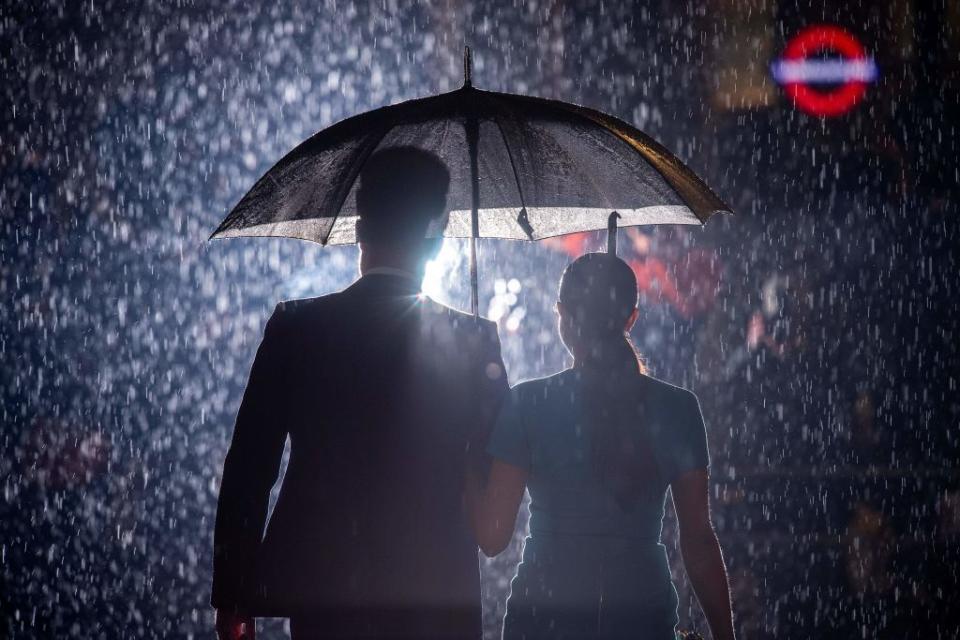
The inner workings of royal reporting can be hard to suss out because of the reliance on anonymous sources. Finding Freedom often shifts into telling the story from Meghan and Harry’s point of view, though Scobie makes clear in the book’s introduction, “As a rule, no member of the British royal family is officially allowed to authorize a biography. However, Carolyn and I were able to gain extensive access to those closest to the couple: friends, trusted aides, senior courtiers, and many individuals in the Sussexes’ inner circle.”
And a spokesperson for the couple said in a statement: “The Duke and Duchess of Sussex were not interviewed and did not contribute to Finding Freedom. This book is based on the authors’ own experiences as members of the royal press corps and their own independent reporting.”
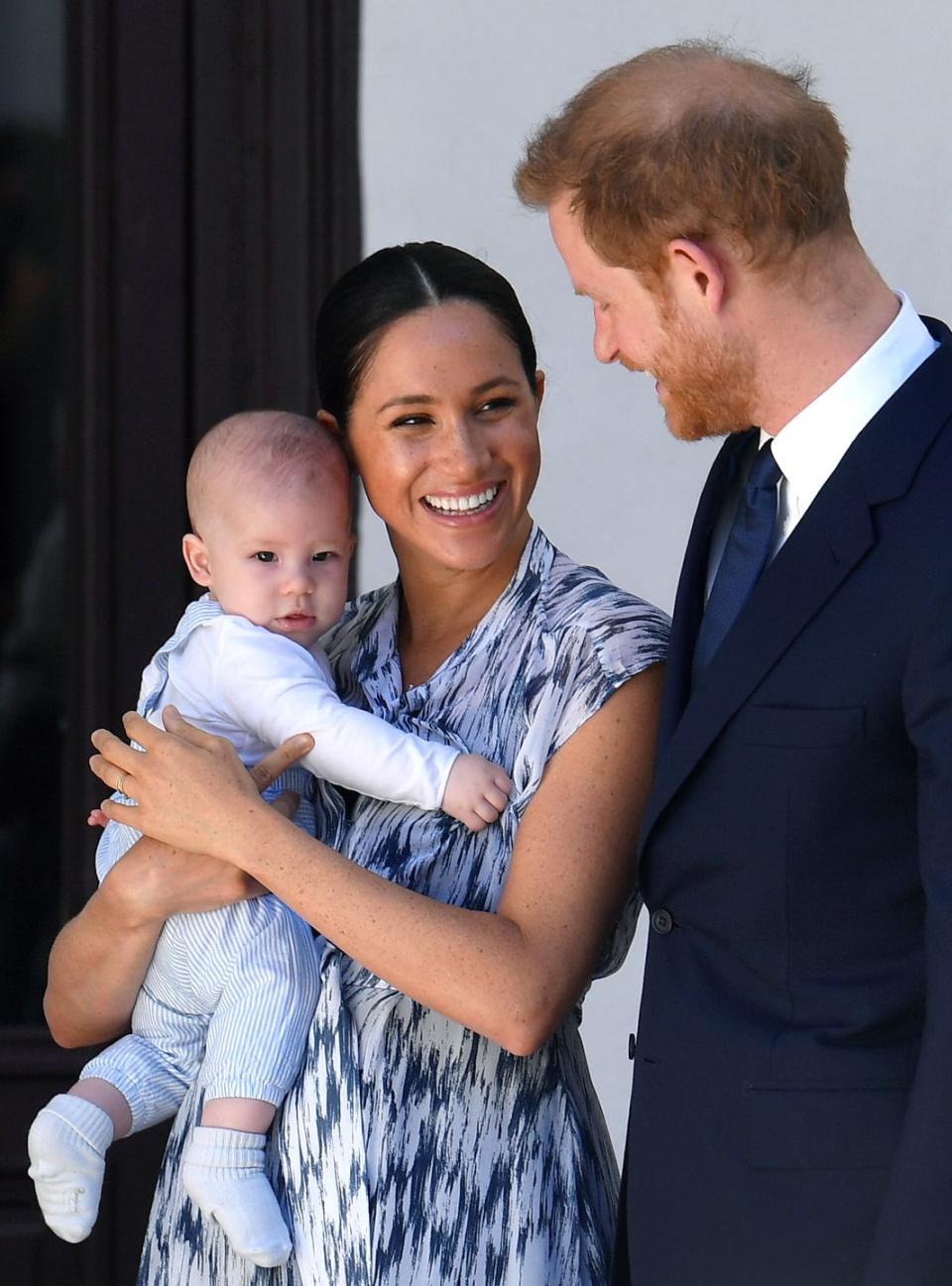
But rumors of cooperation by the royals is a familiar story. In 1992, when Andrew Morton released the book Diana: Her True Story he steadfastly denied Diana was a source, but the truth was that he and Diana were in touch. Unbeknownst to the palace, Diana had recorded answers to Morton’s questions and delivered them to Morton through a mutual friend. So it was technically true they didn’t talk.
The revelations in Morton’s book—Diana’s feelings about Prince Charles’s affair with his now-wife, Camilla Parker-Bowles; her eating disorder; and her deep unhappiness in her royal life—caused a firestorm of controversy when it was published, and many doubted the claims. It wasn’t until after Diana’s tragic death in 1997 that Morton admitted that Diana was the book’s primary source, and he rereleased the book with transcripts of his questions and Diana’s taped answers.
When news from Finding Freedom started trickling out last month, the comparisons to Morton’s work began. Morton himself tweeted: “Take out #Harry and insert #Diana and you have royal #groundhogday. Men in grey. Popularity. Recklessness. Jealousy #findingfreedom is like entering the Windsor time machine.”
Take out #Harry and insert #Diana and you have royal #groundhogday. Men in grey. Popularity. Recklessness. Jealousy #findingfreedom is like entering the Windsor time machine
— Andrew Morton (@andrewmortonUK) July 25, 2020
Morton went on to write biographies of Meghan Markle and controversial royal Wallis Simpson—as well as Monica Lewinsky and Tom Cruise. Scobie too says it’s unlikely his next book will be about the Sussexes.
“Whatever I write next, and I have a couple of things going right now, will be more low-key,” he says. “Should we say…not much to do with royals.”
As for those accusations about Scobie—that he’s merely a mouthpiece for the Sussexes—the book itself helps answer that. While the story is narrowly focused on Meghan and Harry’s experience, it includes reporting from sources close to the rest of the royal family, and offers a far more nuanced view that is sometimes critical of the couple. Meghan and Harry come off looking human but far from perfect.
“It’s a compliment to the book, but from Harry’s point of view there are far too many slightly awkward bits of dirty laundry being aired in the book,” says Duncan Larcombe, a former Sun royal editor who wrote a biography of Prince Harry.
I ask if, through his sources, Scobie knows what Meghan and Harry’s reaction to the book has been. Though we spoke before the book officially came out, three lengthy excerpts had been printed in the Times; and in the ensuing days, more than 170 print articles about Scobie and Durand's reporting had been published. He also says the Sussexes and the palace didn’t receive advance copies of the book, and he hasn’t heard anything yet about their reactions.
The smile he has worn through much of our interview turns into a slight grimace. “Part of me is curious. Part of me doesn’t want to know,” he says. “Listen, I don’t think anybody likes being spoken about. That’s not something you ever get used to.”
Then the smile is back as he shrugs, “We didn’t write the book for Harry and Meghan.”
You Might Also Like

